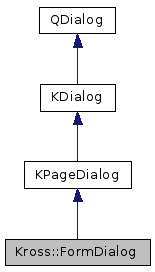Kross
Kross::FormDialog Class Reference
#include <form.h>
Inheritance diagram for Kross::FormDialog:

Public Slots | |
| QWidget * | addPage (const QString &name, const QString &header=QString(), const QString &iconname=QString()) |
| QString | currentPage () const |
| int | exec () |
| int | exec_loop () |
| QWidget * | page (const QString &name) const |
| QString | result () |
| bool | setButtons (const QString &buttons) |
| bool | setButtonText (const QString &button, const QString &text) |
| bool | setCurrentPage (const QString &name) |
| bool | setFaceType (const QString &facetype) |
| void | setMainWidget (QWidget *newMainWidget) |
Public Member Functions | |
| FormDialog (const QString &caption) | |
| virtual | ~FormDialog () |
Detailed Description
The FormDialog class provides access to KDialog objects as top-level containers.
Example (in Python) :
import Kross
import sys,os
ourPath=(filter(lambda p: os.path.exists(p+'/mywidget.ui'),sys.path)+[''])[0]
forms = Kross.module("forms")
mydialog = forms.createDialog("MyDialog")
mydialog.setButtons("Ok|Cancel")
mypage = mydialog.addPage("name","header")
mywidget = forms.createWidgetFromUIFile(mypage, ourPath+'/mywidget.ui')
mywidget["lineEdit"].setText("some string")
if mydialog.exec_loop():
if mydialog.result() == "Ok":
print mywidget["lineEdit"].text
mydialog.deleteLater()
Constructor & Destructor Documentation
Member Function Documentation
|
slot |
Add and return a new page.
- Parameters
-
name The name the page has. This name is for example returned at the currentPage() method and should be unique. The name is also used to display a short title for the page. header The longer header title text used for display purposes. iconname The name of the icon which the page have. This could be for example "about_kde", "document-open", "configure" or any other iconname known by KDE.
- Returns
- the new QWidget page instance.
|
slot |
|
inlineslot |
Shows the dialog as a modal dialog, blocking until the user closes it and returns the execution result.
- Returns
- >=1 if the dialog was accepted (e.g. "Ok" pressed) else the user rejected the dialog (e.g. by pressing "Cancel" or just closing the dialog by pressing the escape-key).
|
inlineslot |
|
slot |
Set the buttons.
- Parameters
-
buttons string that defines the displayed buttons. For example the string may look like "Ok" or "Ok|Cancel" or "Yes|No|Cancel".
- Returns
- true if the passed
buttonsstring was valid and setting the buttons was successfully else false is returned.
Set the text of a button.
Sample how to change the buttons of a dialog;
dialog.setButtons("Yes|No|Cancel")
dialog.setButtonText("Yes","Overwrite")
dialog.setButtonText("No","Skip")
dialog.setButtonText("Cancel","Abort")
- Parameters
-
button string that defines the button that should be changed. text string that should be used as button text.
- Returns
- true if the passed
buttonsstring was valid and setting the button text was successfully else false is returned.
Set the face type of the dialog.
- Parameters
-
facetype the face type which could be "Auto", "Plain", "List", "Tree" or "Tabbed" as defined in KPageView::FaceType .
|
slot |
Set the newMainWidget QWidget as main widget.
This is only needed if you like to replace the KPageDialog page-widget with your own widget.
The documentation for this class was generated from the following files:
This file is part of the KDE documentation.
Documentation copyright © 1996-2014 The KDE developers.
Generated on Tue Oct 14 2014 22:49:54 by doxygen 1.8.7 written by Dimitri van Heesch, © 1997-2006
Documentation copyright © 1996-2014 The KDE developers.
Generated on Tue Oct 14 2014 22:49:54 by doxygen 1.8.7 written by Dimitri van Heesch, © 1997-2006
KDE's Doxygen guidelines are available online.
 KDE API Reference
KDE API Reference